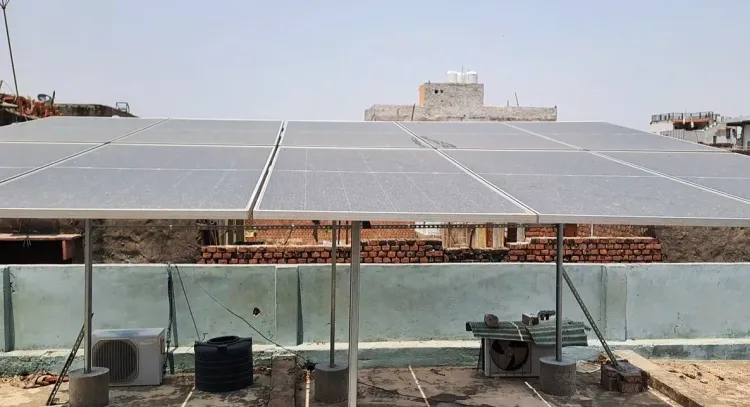How Is the PM Surya Ghar Scheme Transforming Hospitals in Dholpur?

Synopsis
Key Takeaways
- Significant savings on electricity bills for households and institutions.
- Environmental benefits through reduced pollution.
- Support for hospitals in managing energy costs.
- Government commitment to renewable energy.
- Ambitious goals for solar energy expansion in India.
Dholpur, May 22 (NationPress) The PM Surya Ghar: Muft Bijli Yojana, initiated in February 2024, is dramatically reshaping the landscape in Rajasthan’s Dholpur by slashing electricity expenses for both families and institutions, including hospitals.
Residents of Dholpur, who previously faced electricity bills between Rs 9,000 and Rs 10,000 each month, are now enjoying savings of up to 70 percent on their monthly charges after adopting rooftop solar panels through this scheme.
One of the beneficiaries, Nikhil Agarwal, a practicing doctor managing a local hospital, shared his insights with IANS. "Before implementing solar energy via the PM Surya Ghar scheme, our monthly electricity expenses were around Rs 10,000 due to extensive usage of air conditioning, fans, and lighting. Now, our bill has plummeted to just Rs 2,500. This change has greatly alleviated our financial burden and enhanced our peace of mind."
Agarwal emphasized that without this initiative, small and medium-sized establishments would struggle with such exorbitant power expenses.
"This is a remarkable and environmentally friendly initiative. Air pollution is diminishing, and the promotion of clean energy is evident. I express my gratitude to Prime Minister Modi for this considerate program," Agarwal remarked.
The PM Surya Ghar: Muft Bijli Yojana is not only a boon for households; it also provides crucial support to hospitals, clinics, and public facilities that often grapple with high electricity demands. By lessening reliance on traditional energy sources, the scheme is also addressing the frequent power outages in the region.
Lauded as the world's most extensive domestic rooftop solar program, this initiative was officially unveiled by Prime Minister Narendra Modi on February 13, 2024, aiming to deliver solar energy to 1 crore households by March 2027.
The plan features a staggered rollout, targeting 10 lakh installations by March 2025, 20 lakh by October 2025, and 40 lakh by March 2026. A key aspect of this initiative is a subsidy of up to 40 percent on installation expenses, making solar energy more attainable.
The PM Surya Ghar scheme reached a significant milestone with 10 lakh homes becoming solar-powered as of March 10, 2025.
With considerable subsidies, accessible financing opportunities, and a focus on renewable energy, this initiative will not only provide free electricity to households but also yield substantial government savings, lower carbon emissions, and foster job creation.
The Model Solar Village initiative further aids rural regions in achieving energy autonomy, underscoring the government’s dedication to sustainable development. This ambitious program positions India toward a greener and more energy-efficient future, reinforcing its leadership in renewable energy.










